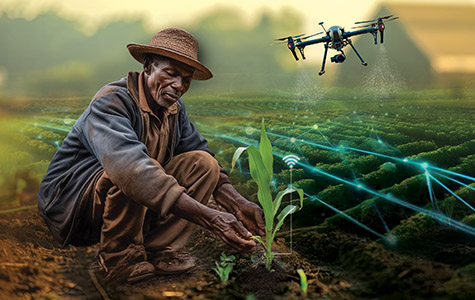Urbanization is a defining global trend of the 21st century. According to the United Nations, 56% of the world’s population currently lives in urban areas, and this figure is expected to rise to 68% by 2050. Africa, home to some of the fastest-growing cities globally, is at the forefront of this transformation. With urban populations projected to triple by 2050, the continent is embracing smart city solutions to address the challenges of rapid urbanization while fostering sustainable development.
The Need for Smart Cities in Africa
Urbanization in Africa presents both opportunities and challenges. On one hand, it drives economic growth, innovation, and improved access to services. Conversely, it strains existing infrastructure, exacerbates environmental degradation, and contributes to social inequalities. The concept of smart cities—leveraging technology and data to improve urban living—offers a pathway to addressing these issues effectively.
.jpg)
Key Drivers of Smart City Development in Africa
- Rapid Urban Growth: Africa’s urban population is expected to grow from 587 million in 2020 to over 1.5 billion by 2050. Cities like Lagos, Nairobi, and Johannesburg are experiencing unprecedented growth, necessitating innovative solutions to manage housing, transportation, and essential services.
- Technological Advancements: The rise of mobile technology and increasing internet penetration fuel smart city initiatives. With over 500 million mobile users and growing connectivity, African cities are adopting technologies such as IoT (Internet of Things), AI (Artificial Intelligence), and big data analytics.
- Government and International Support: Many African governments, along with international organizations, are investing in smart city projects. Initiatives like the African Smart Cities Network aim to promote knowledge sharing and collaboration across the continent.
- Environmental Sustainability: Climate change and resource depletion are pressing concerns for African cities. Smart cities prioritize sustainability by integrating renewable energy, efficient waste management, and green building practices.
Examples of Smart City Projects in Africa
- Konza Technopolis, Kenya: Known as "Silicon Savannah," Konza Technopolis is a flagship smart city project located outside Nairobi. It aims to be a hub for technology, innovation, and education, featuring advanced infrastructure and sustainable urban planning.
- Eko Atlantic City, Nigeria: Built on reclaimed land along Lagos’ coastline, Eko Atlantic City is designed to be a sustainable urban center with cutting-edge infrastructure, renewable energy systems, and resilient defenses against rising sea levels.
- Cape Town Smart City Initiatives, South Africa: Cape Town leverages smart technology for traffic management, water conservation, and renewable energy. The city’s efforts in deploying IoT sensors and data analytics have improved service delivery and resource management.
- Rwanda’s Vision City: Rwanda is integrating smart technology into its urban planning efforts, with Vision City as a prime example. This project incorporates energy-efficient buildings, digital connectivity, and green spaces to enhance urban living.
Challenges in Building Smart Cities
While the vision of smart cities is promising, several obstacles remain:
- Limited Funding: Building smart cities requires significant investments. Many African countries face budget constraints, making it challenging to finance large-scale projects.
- Infrastructure Gaps: Existing infrastructure in many cities is outdated or inadequate, posing hurdles to implementing advanced technologies.
- Digital Divide: Despite progress, internet penetration and digital literacy levels remain low in some regions, limiting the reach of smart city solutions.
- Policy and Regulatory Barriers: Innovative city development requires supportive policies and regulations. A lack of coordinated urban planning and governance frameworks can hinder progress.
Opportunities and Future Outlook
Despite these challenges, the rise of smart cities in Africa presents immense opportunities:
- Economic Growth: Smart cities drive innovation, attract investments, and create jobs. For instance, Konza Technopolis is expected to contribute significantly to Kenya’s GDP.
- Improved Quality of Life: By addressing urban challenges, smart cities enhance living standards, providing better housing, transportation, and public services.
- Global Partnerships: International collaborations can accelerate innovative city development. Partnerships with technology companies and donor agencies are already yielding results in projects like Eko Atlantic City.
Conclusion
Africa’s urbanization trends are reshaping the continent, and smart cities are emerging as a key solution to the challenges and opportunities of rapid urban growth. By leveraging technology, fostering collaboration, and prioritizing sustainability, African smart cities can be models for innovation and resilience. As global urbanization accelerates, Africa’s smart cities are poised to play a pivotal role in shaping the cities of the future.
CSM has been at the forefront of building technology interfaces across multiple smart cities. Our Smart City suite of products and services can help the future cities build robust infrastructure that makes citizen services easier to access and allows various departments to access information, monitor performance, and manage grievances, all in a single platform.














.jpg)




























We will verify and publish your comment soon.